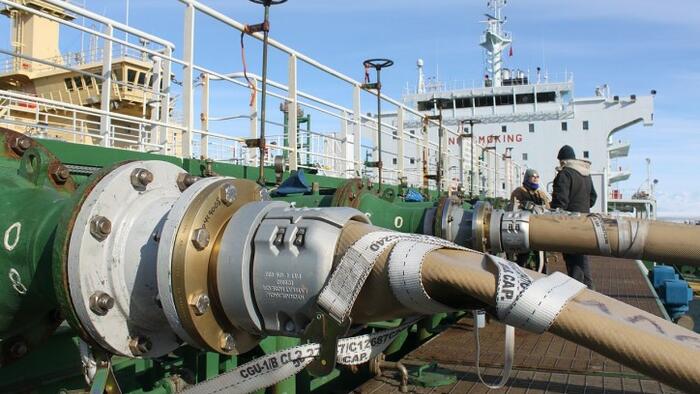 ,/A>
,/A>Posted on 04/01/2022 5:06:08 PM PDT by blam
 ,/A>
,/A>
A major bunker fuel contamination has been reported in Singapore, the world’s largest bunkering hub, with dozens of ships receiving tainted high sulfur fuel oil (HSFO) that has led to dangerous power blackouts, according to Bloomberg.
Fuel testing firm Veritas Petroleum Services (VPS) reports 34 vessels were identified to have received HSFO from two unidentified Singapore suppliers between February and March. The marine fuel contained up to 2,000 parts per million (ppm) of chlorinated hydrocarbons.
“These bunker fuel contaminations have affected 14 vessels so far and the impact has been failure of the fuel system to the auxiliary engine resulting in loss of power and propulsion creating a blackout.
“Fuel system failure arose from seizure of the fuel pumps and plunger and barrel corrosion, caused by the bunker fuel contaminants,” VPS said in the statement.
Out of the 34 vessels, almost half experienced power blackouts with the loss of propulsion systems, creating a hazardous situation if the ships were underway.
Such incidents could dent demand for bunker fuel in Singapore which is at the crossroads of a centuries-old trade route that links Asia to Europe and the Middle East to the US.
Maritime news website Splash 247 reported in early March that the contaminated fuel contains “abrasive particles that could cause accelerated wear of diesel engine components.”
This is just another wrench thrown into the snarled global supply chain as one can only imagine the affected ships would need to go down for maintenance and repairs.
For some color on the state of the current global supply chain, Goldman Sachs’ Jordan Alliger notes this week, “we are past peak bottlenecks.” Even though congestion remains elevated, supply chains around the world are normalizing.

As for the vessels affected by contaminated marine fuel, no information was given on what type of ships were affected nor size or maintenance and repair timelines.
I said sabotage, because I know you could supply filters to these ships with compromised fuel filters, that would do it...even if the fuel met spec.
If something like this happens, a proper investigation is to retrieve the fuel filters for analysis.
https://www.maritimemanual.com/bunkering-in-ships/
https://www.youtube.com/watch?v=3677LiwXRDQ
See this picture, you can see the sample collection pipe coming out of the coupler, that thin pipe in the picture.
So do the chlorinated HCLs create a hydrochloric acid problem? Asking for a friend.
I bet, all parties were in on a fraud, substandard fuel, fake samples, and they split the money and hoped the fuel filtering system would clean it up.
One well known HCL is ethylene dichloride that was once widely used in vapor degreasing but was regulated out of existence for this use because of its carcinogenic hazard. It is still used for manufacturing a class of plastics.
I don't think combustion itself would form HCl. I think that chloride in the exhaust gas though would contact water in the form of air humidity and form HCl hydrochloride acid. At the least, service life of exhaust ducts could be reduced due to corrosion.
As far an engine though and having the reported 2000ppm HCLs chlorinated hydrocarbons in the HSFO, what I think could occur long term is damage to certain metal parts. Chlorides + high temperature damage various metallurgies. Examples…. 300 series stainless steels can get chloride stress cracking and fail, not good. 400 series stainless steels work fine. IIRC, Hasteloy, Inconel and Monel are also incompatible with high temps and chlorides. Seal and gasket materials would also have to specified for compatibility to chlorides.
Thank you, very interesting. So considering that ship fuel consumption is massive in volume, could someone be using it to dispose hazardous waste?
With this situation on the www.gcaptain.com radar, they are very good at tracking high profile maritime events whether it's days, weeks or several years with updates. I'll post up if I catch an update.
Just as it stands now with what is publicly known, I expect that the costs involved will in the several hundreds of million $$$. Delayed shipping, ships loosing power, engine repairs increasing out of service downtime, fuel swap out and system cleaning, etc.
It wouldn't surprise me if some of the ships involved end up declaring Force Majure by being rendered unseaworthy due to engine repair downtime radically affecting on board container delivery time and costs. To me, this is one of the unknowns floating out there.
Where ever those ships make their next port, they will not be allowed to depart without a very thorough inspection by Port and Flag authorities, owners and insurers. Any of these parties can take a ship out of service pending repairs, etc.
https://gcaptain.com/singapore-investigating-alleged-bunker-fuel-contamination/
Disclaimer: Opinions posted on Free Republic are those of the individual posters and do not necessarily represent the opinion of Free Republic or its management. All materials posted herein are protected by copyright law and the exemption for fair use of copyrighted works.